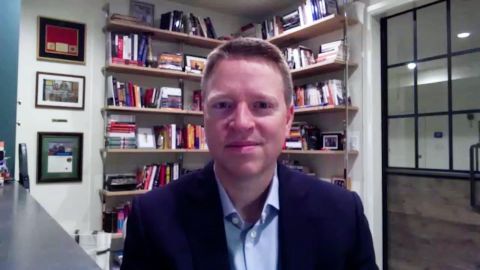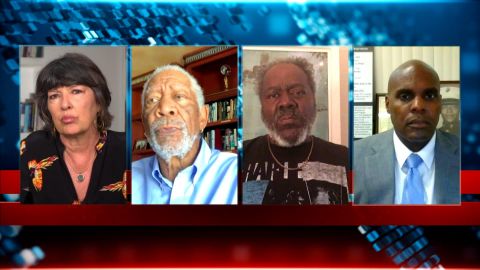Read Transcript EXPAND
CHRISTIANE AMANPOUR: And now, we turn to Asia where North Korea claims it has successfully test fired new cruise missiles. Our next guest, Matthew Pottinger, focused on Asia before becoming President Trump’s deputy national security advisor. Here he is speaking to Walter Isaacson about the threats to the region and why he resigned from the White House after the January 6th attack on the capitol.
(BEGIN VIDEO CLIP)
WALTER ISAACSON: Thanks, Christiane. And, Matt Pottinger, welcome to the show.
MATTHEW POTTINGER, CHINA PROGRAM CHAIRMAN, HOOVER INSTITUTION, STANFORD UNIVERSITY, FORMER U.S. DEPUTY NATIONAL SECURITY ADVISOR: Thanks for having me, Walter. Great to be with you.
ISAACSON: We’re just learning on the news today that North Korea is again testing long-range missiles. What does that mean and what should we be doing?
POTTINGER: Yes, you know, I think that North Korea is watching the mistaken — you know, the mistake of the Biden administration’s moving forward with trying to negotiate again with Iran on Iran’s terms. I think they have seen this withdraw from Afghanistan. They have seen us make unilateral concessions to Russia, since President Biden is coming to office, this one mystified a lot of the people that I work closely with, why would reallow Russia to build, for example, against the wishes of Congress and against the wishes of our European allies with the exception of Germany? Why would they allow Russia to build a gas pipeline straight into the heart of Europe bypassing Ukraine? So, you know, I think that Kim Jong-un is a savvy character. He watches what we’re doing. He watches how we’re doing in other parts of the world. And then makes, you know, calculations about whether he wants to go back to an old playbook.
ISAACSON: But you and the Trump administration tried pretty hard to engage him, to actually negotiate with him personally, right?
POTTINGER: I’m not against engaging dictators, particularly at their level. My view is that you are better off going leader to leader than going through the charade of having a bunch of mid-level diplomats spend years negotiating an agreement that dictators end up, you know, reneging on 10 minutes later. I’m not against the idea of us engaging with dictators. But what I have a problem with is when we make unilateral concessions in the expectation that dictators are then going to treat us fairly, that is just not how those systems work. So, I think we might be moving back towards this pattern which we had been able to short circuit. At end of 2017, we had applied so much economic pressure through the U.N. Security Council, economic pressure in the form of sanctions on North Korea that their nuclear and long-range missiles tests stopped at the end of 2017. And, you know, it’s been almost, you know, whatever, four years since they have started again. He maybe now testing the waters again to see whether he can provoke in a way that would lure the Biden administration into going back to the pretty stupid pattern that we followed for 30 years of mid-level negotiations that take years, involve us giving significant concessions only for us to be disappointed in the final result.
ISAACSON: So, you were a marine, two tours, in Afghanistan. First of all, what did you make of our withdrawal from Afghanistan?
POTTINGER: Well, the way in which we’ve withdrawn has dealt a grave blow to our standing. There is no question about that. When we see our European partners, in some cases, censuring the president of the United States. I think it’s been painful for veterans, certainly, to watch and many of us have been engaged in trying to get people out of Afghanistan who worked most closely with us to try to establish a viable government there. So, certainly, the short-term impact has been quite grave. Medium, longer- term impact is a much tougher guess, right? We know that this has done damage to India. India, in a certain respect, now that the Taliban has taken over most of Afghanistan. In some respects, India is now having to worry about two Pakistan’s on its northern flank. We don’t want India to be encumbered by additional threats of terrorism, and because we need India as a partner to help counterbalance China’s ambitions throughout the region. So, that is on the negative side. The Biden administration has tried to describe this as — our withdrawal from Afghanistan as an opportunity to double down on the Western Pacific Region and to ensure that Southeast Asian countries, Pacific countries, Japan, Australia, South Korea remain independent and strong and safe from China’s ambitions, not to mention Taiwan. So, I’m hopeful that the Biden administration follows through on proving that our loss in Afghanistan will be our gain somehow in the Western Pacific.
ISAACSON: But it was the Trump administration, with you as deputy national security advisor and Trump as president, who set a time to get out of Afghanistan. Was that a mistake?
POTTINGER: Well, you know, I think that we saw a timeline set multiple times, and then we were able to push that timeline out contingent upon the Taliban actually making good on the promises that it made in that agreement
ISAACSON: So, you are saying Trump would have pushed it out and not followed the accord that he signed?
POTTINGER: I think you would have to ask him. I think that there is a — there were earlier — their ambitions during the Trump presidency to get out earlier that be we did, you know, Trump finished his term without having completely gotten out.
ISAACSON: Were you among those pushing not to get out too quickly?
POTTINGER: Yes, my view was that keeping several thousand troops, and again, in sort of a background role where they’re providing support, we’re providing money and expertise and contractors are able to keep equipment and aircraft up in the air and to provide the all-important close air support from the U.S. air force to navy would allow us to buy time. It wasn’t going to win this war in — in the — you know, as defined at various points over the course of that 20-year conflict. At certain points, we thought we could completely defeat the Taliban and establish, you know, a sovereign centralized democracy. I think that that is a pipe dream. That would continue to be a pipe dream. Even if we had stayed. But Afghanistan, you know, we don’t need for Afghanistan to become, you know, a Western European democracy in order for us to help protect ourselves. We just need Afghanistan to be a better Afghanistan than —
ISAACSON: Let me make sure I understand this. I mean, when you said you would have kept a few thousand troops indefinitely, Trump basically went against that advice, right?
POTTINGER: Yes. I mean, the agreement that was signed said that we were going to get out completely in May, assuming that the Taliban work towards, you know, a unity government, a partnership whether they would reach through negotiation not through the barrels of their guns. And also, that they would no longer support al-Qaeda. Now, we’ve just seen that the leader of al-Qaeda, Ayman al-Zawahiri, who we’ve not heard from in a very long time, they’ve just released — al-Qaeda just release a video by him. I think that that is a hint of what’s to come. I don’t think that those links between the Taliban and al-Qaeda have been severed. Far from it. I think we’re going to learn the hard way that, you know, in coming months that al-Qaeda is going to be back in business.
ISAACSON: So, was that disengagement agreement for this May that Trump has done, was that a mistake?
POTTINGER: I think that the — it hadn’t yet been fulfilled on the part of the Taliban. So, it would have been a mistake to get out in May given where the Taliban was in reality and what they were failing to do to keep up their side of that bargain, yes.
ISAACSON: President Biden and China president, Xi Jinping, a few days ago had a conversation. Went on for an hour and a half, and it was not really a great conversation. For years, we thought engagement with the Chinese and economic engagement with Disney and Apple would help make our relationships with China good. Was that a flawed thesis?
POTTINGER: Yes, I think it was. And it is one that a lot of us all subscribed to, if we’re honest with ourselves. We had a bipartisan, really whole of society consensus that, at the end of the Cold War, with our success and triumph in that Cold War, that it was inevitable that China was going to have to liberalize overtime as well and that we could hasten that liberalization by engaging with China. And it was a — it was big hearted. It was optimistic. And it was also a little bit arrogant. And unfortunately. turned out to be wrong. We thought that by opening up our markets, providing capital, training China’s entrepreneurs and scientists and military officers and government technocrats that we would hasten this liberalization of their markets at first. And hoped over time, we’d make their system a bit more pluralistic as well, the political system. We now know, you know, 20, 30 years on, it’s been 20 years since China entered the World Trade Organization, that China is not only not liberalizing anymore, it is actually moving backwards towards an earlier era.
ISAACSON: You know, I’ve watched your career ever since you were at Wall Street. Great Wall Street journal reporter in China and through many things, the marine corps. Tell me, why did you join the Trump administration?
POTTINGER: Yes. Well, you know, I’m — I swore an oath when I became a marine to the Constitution of the United States. And that’s my north star, you know. And you know, I’m — I believe that when president of the United States asks you to serve, you — your default decision has got to be to say yes. I’m really proud of my service in the Trump administration. I’m very proud of the foreign policy that came out of the Trump administration. I think it’s been undervalued in, you know, sort of mainstream discourse. And over time, I think people are going to realize that some of the things that we achieved with the paradigm shift on our approach to China, strengthening NATO, in reality, even though we were tough on NATO rhetorically, we were able to extract, you know, hundreds of billions of additional dollars over the course of the decade for European countries to stand up for their defense. And then, you have got things like the Abraham Accords. I mean, that would have been — I mean, if that had been a different administration that it achieved, you know, peace between Israel and multiple Sunni-Arab, you know, monarchies, that would have been a pretty big story, I think, in a different administration. So, you know, we pulled some rabbits out of the hat.
ISAACSON: In your foreign affairs piece you talk about how China has now adopted a tactic, I think, Russia had been using of using our own social media to do things like spread conspiracy theories. Spread what QAnon is saying, undermine belief in vaccines. Undermine various ways, public health measures for COVID and vaccinations. How dangerous is that and why haven’t more Republicans pushed back against these disinformation campaigns, much of which, according to your piece, are being amplified by China to undermine our country?
POTTINGER: Yes, yes. I think that authoritarian governments are looking at our social media platforms as a golden opportunity for them to influence American populations and the populations of other free societies. And so, the Russians — but the Chinese now, probably with even greater resources than the Russians applied, have banned all of our platforms in their own borders but are now energetically using them for both overt propaganda but also convert propaganda that makes use of algorithms and bots and proxies that try to create the illusion of organic, real citizen discourse, when in fact, it is highly orchestrated discourse designed to do a number of things. And you have mentioned some of them. One of them is designed to find those areas where there are divisions in our society or at least cracks and to try to tap wedges into those cracks. They are trying to, you know, amp up division and controversy. Another area is simply to try to cause Americans to lose faith in our system of government, even though our system of government, for all of its flaws, has worked pretty darn well and hell of a lot better than China’s system of governance has worked for its people. Remember, the communist party has only been in power for seven decades in China. They have killed roughly 50 million of their own people through abuse by Mao Zedong, through The Great Leap Forward, cultural revolution and many people fear that we may be sliding back into an era where — because all decisions are now being made by one man at the top, if that one man at the top makes a mistake, that is going to reverberate through society in ways that can be extremely disruptive and even deadly. So, they are trying to cause people to doubt that our system of government can deliver. And so, I’m — I actually give credit to President Biden for having spoken out repeatedly about the idea that this is really, in some respects, an ideological competition that we’re in. It is about, as he’s put it, whether democracy is still going to prove itself and refresh itself, to continue to be the greatest hope for humanity or whether we’re going allow this flowing tide of authoritarianism to corrupt our systems and undermine our sovereignty.
ISAACSON: So, do you think President Trump and maybe some of o his enablers and supporters also helped spread disinformation, whether it be on COVID or even about the election?
POTTINGER: Well, I think that the election outcome was litigated and judges, some of them appointed by President Trump himself, came out with their determination on the outcome and that led to President Biden being the president. I think that we have to realize that part of upholding the constitution is to live by the three branches of our government. And when judges determine that the election has come out a certain way, you have got respect that and we move on.
ISAACSON: You are saying Trump really should quit saying that the election was stolen?
POTTINGER: Yes, I don’t think that we can say that the election was stolen when, under our system, judges determined that, you know, the outcome came out the way it did. That doesn’t mean that we shouldn’t find ways to improve our election system so that everybody can have confidence that our elections are free and fair. And we’ve obviously got a lot of work to do on that, and I hope we move forward with that in a very bipartisan way.
ISAACSON: But you quit. You resigned from the Trump administration the day after the assault on the capitol. Was that because you were worried about the threats of democracy that had been happening there and because the administration had helped stoke some of that?
POTTINGER: Now, I resigned on the 6th. The afternoon of the — of those protests. And, you know, I felt just given the events of that day that it was appropriate for me to leave.
ISAACSON: Matt Pottinger, thank you so much for joining us.
POTTINGER: Thanks, Walter. It’s great to be with you.
About This Episode EXPAND
Tara Haelle; Dr. Jeanne Marrazzo; “The Killing of Kenneth Chamberlain;” Matt Pottinger
LEARN MORE


